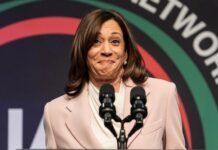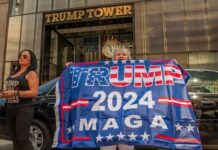
In a bold move to defend the democratic process and the rights of candidates to run for office, Colorado Republicans have taken a stand against what they perceive as an overreach of constitutional interpretation. The state’s GOP has filed an appeal to the U.S. Supreme Court, seeking to overturn a decision that would disqualify former President Donald Trump from appearing on Colorado’s presidential ballot.
The crux of the controversy lies in the application of the 14th Amendment’s third clause, which bars individuals from holding office if they have engaged in insurrection. The Colorado Supreme Court’s decision to invoke this clause against Trump has sparked a heated debate over its meaning and relevance, particularly given that Trump has never been formally charged with insurrection.
Trump calling them out! pic.twitter.com/KF6fdbe6PN
— Sadie 🇺🇸 👩🌾 (@Sadie_NC) December 28, 2023
This unprecedented legal challenge has not only implications for Colorado but could also set a significant precedent nationwide. With the potential to influence other states’ decisions regarding candidate eligibility, the outcome of this appeal is being closely watched by political observers and legal experts alike.
Despite the partisan appointments of the Colorado high court justices, the decision to disqualify Trump did not fall strictly along party lines, with three Democrat-appointed justices dissenting. This underscores the complexity and nuance of the constitutional questions at hand, which transcend simple political allegiances.
Trump is the fighter that America needs right now. 💪
MAGA 🇺🇸 pic.twitter.com/tUqDBnAwHS
— Freedom 🇺🇸🦅 (@PU28453638) December 28, 2023
The plaintiffs in the Colorado case, comprising both Republican and unaffiliated voters, have voiced their concerns about the interpretation of the insurrection clause. They argue that the clause was never intended to be used as a political tool to bar candidates from elections without due process and a formal charge.
The Michigan Supreme Court’s recent ruling, which allowed Trump to remain on the ballot, contrasts sharply with Colorado’s stance and highlights the lack of consensus on the issue. As a swing state, Michigan’s decision carries considerable weight and may influence the Supreme Court’s approach to the Colorado appeal.
Louisiana’s entry into the fray with a similar lawsuit adds another layer to the unfolding legal drama. The question of whether Trump’s actions on January 6, 2021, constitute insurrection according to the 14th Amendment is now at the forefront of a national conversation about the limits of political accountability and the sanctity of electoral integrity.
As the Supreme Court prepares to hear the Colorado GOP’s appeal, the nation awaits a ruling that will not only affect the 2024 presidential race but also potentially reshape the understanding of the Constitution’s provisions regarding qualifications for public office. The outcome of this case could very well redefine the boundaries of political candidacy in America for generations to come.












